Fleurs du Mal Magazine


Or see the index
Paul Celan, der meistgedeutete deutschsprachige Dichter nach 1945, ist auch der Autor eines eminenten Briefwerks.
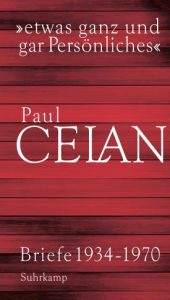 Mit dieser Ausgabe wird es nun erstmals als eigenes Werk sichtbar: in 691 Briefen, davon 330 bisher unpubliziert, an 252 Adressaten. Wer sind die Adressaten? Es sind die Mitglieder der Familie, geliebte Frauen, befreundete Autoren, sehr junge und begeisterte Leser, Übersetzerkollegen, französische Philosophen ebenso wie deutsche Germanisten und die Mitarbeiter vieler Verlage. Aus alledem entsteht in chronologischer Folge über vier Jahrzehnte ein Leben aus Briefen.
Mit dieser Ausgabe wird es nun erstmals als eigenes Werk sichtbar: in 691 Briefen, davon 330 bisher unpubliziert, an 252 Adressaten. Wer sind die Adressaten? Es sind die Mitglieder der Familie, geliebte Frauen, befreundete Autoren, sehr junge und begeisterte Leser, Übersetzerkollegen, französische Philosophen ebenso wie deutsche Germanisten und die Mitarbeiter vieler Verlage. Aus alledem entsteht in chronologischer Folge über vier Jahrzehnte ein Leben aus Briefen.
In ihnen zeigt sich Celan als herausragender Korrespondenzpartner mit einer enormen stilistischen Bandbreite, ausgeprägt in seiner Fähigkeit, auch auf Unbekannte einzugehen. Die Briefe offenbaren eine Vielzahl bisher verborgener biografischer Fakten, ermöglichen eine Präzisierung seiner Poetologie und zeigen ihn zugleich als Menschen in seinem ganz gewöhnlichen Alltag.
Das Jahr 2020 steht ganz im Zeichen von Paul Celan: Am 20. April jährte sich sein Todestag zum fünfzigsten Mal, und am 23. November 2020 wäre einer der wichtigsten deutschsprachigen Dichter nach 1945 einhundert Jahre alt geworden.
Paul Celan wurde als Paul Antschel am 23. November 1920 als einziger Sohn deutschsprachiger, jüdischer Eltern im damals rumänischen Czernowitz geboren. Nach dem Abitur 1938 begann Celan ein Medizinstudium in Frankreich, kehrte jedoch ein Jahr später nach Rumänien zurück, um dort Romanistik zu studieren. 1942 wurden Paul Celans Eltern deportiert. Im selben Herbst starb sein Vater in einem Lager an Typhus, seine Mutter wurde erschossen. Von 1942 bis 1944 musste Celan in verschiedenen rumänischen Arbeitslagern Zwangsarbeit leisten.
Von 1945 bis 1947 arbeitete er als Lektor und Übersetzer in Bukarest, wo auch erste Gedichte von Celan erschienen. Im Juli 1948 zog er von Wien aus nach Paris, wo der Dichter bis zu seinem Tod lebte. Dort lernte Celan 1951 die Künstlerin Gisèle de Lestrange kennen, die er ein Jahr später heiratete. Ihr gemeinsamer Sohn Eric kam 1955 zur Welt. Im Frühjahr 1970 nahm sich Celan in der Seine das Leben. (Suhrkamp Verlag)
“Dieses aus- und eindrucksvolle Mosaik ist die große Leistung der Herausgeberin Barbara Wiedemann, die schon so viele Publikationen zu Paul Celan verantwortet hat.” – Martin Oehlen, Frankfurter Rundschau
Paul Celan
“Etwas ganz und gar Persönliches”
Briefe 1934-1970
Herausgegeben und kommentiert von Barbara Wiedemann
Deutschsprachig
Leinen
Literatur
Suhrkamp Verlag
1286 Seiten
78,00 €
Erschienen: 14.12.2019
ISBN: 978-3-518-42888-7
# new books
Paul Celan
Briefe 1934-1970
• fleursdumal.nl magazine
More in: - Book News, - Bookstores, Archive C-D, Archive C-D, Bachmann, Ingeborg, Celan, Paul, Paul Celan
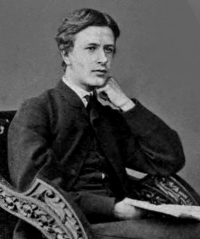
Enough
When all my words were said,
When all my songs were sung,
I thought to pass among
The unforgotten dead,
A Queen of ruth to reign
With her, who gathereth tears
From all the lands and years,
The Lesbian maid of pain;
That lovers, when they wove
The double myrtle-wreath,
Should sigh with mingled breath
Beneath the wings of Love:
‘How piteous were her wrongs,
Her words were falling dew,
All pleasant verse she knew,
But not the Song of songs.’
Yet now, O Love, that you
Have kissed my forehead, I
Have sung indeed, can die,
And be forgotten too.
Digby Mackworth Dolben
(1848 – 1867)
Enough
• fleursdumal.nl magazine
More in: Archive C-D, Archive C-D, Digby Mackworth Dolben
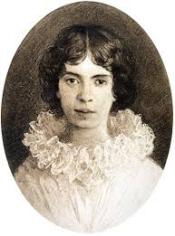
Parting
My life closed twice before its close;
It yet remains to see
If Immortality unveil
A third event to me,
So huge, so hopeless to conceive,
As these that twice befell.
Parting is all we know of heaven,
And all we need of hell.
Emily Dickinson
(1830-1886)
Parting
• fleursdumal.nl magazine
More in: Archive C-D, Archive C-D, Dickinson, Emily

After reading Homer
Happy the man, who on the mountain-side
Bending o’er fern and flowers his basket fills :
Yet he will never know the outline-power,
The awful Whole of the Eternal Hills.
So some there are, who never feel the strength
In thy blind eyes, majestic and complete,
Which conquers those, who motionlessly sit,
O dear divine old Giant, at thy feet.
Digby Mackworth Dolben
(1848 – 1867)
After reading Homer
• fleursdumal.nl magazine
More in: Archive C-D, Archive C-D, Digby Mackworth Dolben
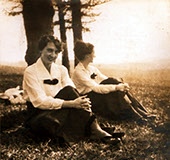
The Poet’s Thrift
My landscape only need comprise low hills,
For these are eminent and limitless
To me. They mean more than my dreams express;
They mean more than my word or deed fulfils.
The slender trees, the tuneless whip-poor-wills,
Impart quite ample themes to loneliness.
I find enough in scant elusiveness
Of springs and little brooks. My spirit thrills
To beauty, unprepared for the sublime.
I wonder, though, when I shall be completed
Even to transcribe these hills? Sometime
This landscape in few lines will show to me
The subtle mysteries I have entreated,
In the simple realm of poetry.
Gladys Cromwell
(1885-1919)
The Poet’s Thrift
From: Songs of the Dust, 1915
• fleursdumal.nl magazine
More in: Archive C-D, Cromwell, Gladys, Gladys Cromwell
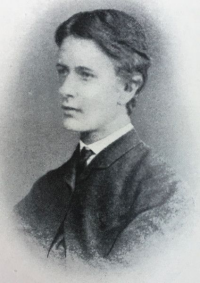
A Song
The world is young today:
Forget the gods are old,
Forget the years of gold
When all the months were May.
A little flower of Love
Is ours, without a root,
Without the end of fruit,
Yet ― take the scent thereof.
There may be hope above,
There may be rest beneath;
We see them not, but Death
Is palpable ― and Love.
Digby Mackworth Dolben
(1848 – 1867)
A Song
• fleursdumal.nl magazine
More in: Archive C-D, Archive C-D, Digby Mackworth Dolben
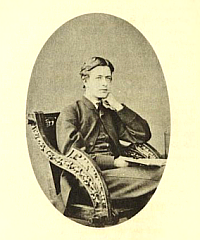
From Sappho
Thou liest dead, lie on: of thee
No sweet remembrances shall be,
Who never plucked Pierian rose,
Who never chanced on Anteros.
Unknown, unnoticed, there below
Through Aides’ houses shalt thou go
Alone, for never a flitting ghost
Shall find in thee a lover lost.
Digby Mackworth Dolben
(1848 – 1867)
From Sappho
• fleursdumal.nl magazine
More in: Archive C-D, Archive C-D, Digby Mackworth Dolben, Sappho
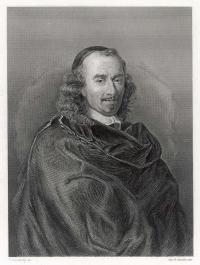
Chanson
Vos beaux yeux sur ma franchise
N’adressent pas bien leurs coups,
Tête chauve et barbe grise
Ne sont pas viande pour vous ;
Quand j’aurais l’heure de vous plaire,
Ce serait perdre du temps ;
Iris, que pourriez-vous faire
D’un galant de cinquante ans ?
Ce qui vous rend adorable
N’est propre qu’à m’alarmer,
Je vous trouve trop aimable
Et crains de vous trop aimer :
Mon cœur à prendre est facile,
Mes vœux sont des plus constants ;
Mais c’est un meuble inutile
Qu’un galant de cinquante ans.
Si l’armure n’est complète,
Si tout ne va comme il faut,
Il vaut mieux faire retraite
Que d’entreprendre un assaut :
L’amour ne rend point la place
À de mauvais combattants,
Et rit de la vaine audace
Des galants de cinquante ans.
Pierre Corneille
(1606-1684)
Chanson
• fleursdumal.nl magazine
More in: Archive C-D, Archive C-D, Corneille, Pierre

A Syllable
Could mortal lip divine
The undeveloped freight
Of a delivered syllable,
’T would crumble with the weight.
Emily Dickinson
(1830-1886)
A Syllable
• fleursdumal.nl magazine
More in: Archive C-D, Archive C-D, Dickinson, Emily
De E. du Perronprijs 2019 is toegekend aan Ellen Deckwitz voor haar bundel Hogere Natuurkunde (Uitgeverij Pluim).
De jury bekroont een fascinerende en onheilspellende dichtbundel, waarin verschillende genres, stemmen en stemmingen met elkaar worden verweven. De andere genomineerden waren Stephan Enter (Pastorale) en Asha Karami (Godface).
 Aan het woord is een kleindochter die de stem van haar grootmoeder laat klinken en haar oorlogservaringen in Nederlands-Indië onder woorden probeert te brengen.
Aan het woord is een kleindochter die de stem van haar grootmoeder laat klinken en haar oorlogservaringen in Nederlands-Indië onder woorden probeert te brengen.
Het levensverhaal wordt alleen in flarden verteld. Deckwitz’ verhalende poëzie laat zien hoe families getekend worden door een land van herkomst dat werd verwoest. Het leed en de veerkracht, ingewikkeld met elkaar verbonden, blijven bestaan in elkaar opvolgende generaties. Dit is een bundel die in een tijd van mondiale crisis troost en relativering biedt.
De prijs bestaat uit een geldbedrag van 2500 euro en een textielobject, ontworpen door studio ‘by aaaa’ (Moyra Besjes en Natasja Lauwers) en vervaardigd bij het TextielMuseum in Tilburg.
De uitreiking is uitgesteld naar het najaar en vindt plaats op 15 oktober 2020, aanvang 20.00 uur in de LocHal aan de Burgemeester Brokxlaan 1000 in Tilburg. Voorafgaand aan de uitreiking houdt Maxim Februari, winnaar van de P.C. Hooft-prijs 2020, de negende E. du Perronlezing met als titel ‘E. du Perron en de pseudo-identiteiten’.
De E. du Perronprijs is een initiatief van de Gemeente Tilburg, de Tilburg School of Humanities and Digital Sciences van Tilburg University en Kunstloc Brabant. Vorig jaar won Jan Leyers de prijs voor zijn boek Allah in Europa. Eerdere laureaten waren onder meer Margot Vanderstraeten (2017), Stefan Hertmans (2016) en Ilja Leonard Pfeijffer (2015).
Voor tijden, programma en aanmelding, zie www.kunstlocbrabant.nl/eduperron2019
Hogere natuurkunde
Auteur: Ellen Deckwitz
Uitgever: Uitgeverij Pluim
Taal: Nederlands
Hedendaagse poezie
Bindwijze: Paperback
Druk 1
September 2019
Aantal pagina’s: 80
EAN 9789492928054
NUR code 301
EUR 21,99
• fleursdumal.nl magazine
More in: #Editors Choice Archiv, - Book News, Archive C-D, Archive C-D, Awards & Prizes
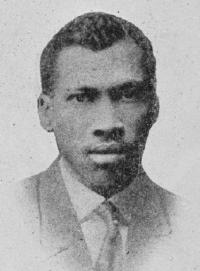
The Poet
The poet sits and dreams and dreams;
He scans his verse; he probes his themes.
Then turns to stretch or stir about,
Lest, like his thoughts, his strength give out.
Then off to bed, for he must rise
And cord some wood, or tamp some ties,
Or break a field of fertile soil,
Or do some other manual toil.
He dare not live by wage of pen,
Most poorly paid of poor paid men,
With shoes o’er-run, and threadbare clothes,—
And editors among the foes
Who mock his song, deny him bread,
Then sing his praise when he is dead.
Raymond Garfield Dandridge
(1882 – 1930)
The Poet
• fleursdumal.nl magazine
More in: Archive C-D, Archive C-D, CLASSIC POETRY
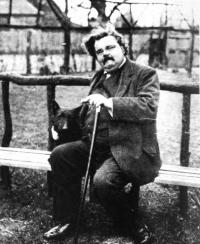
Nightmare
The silver and violet leopard of the night
Spotted with stars and smooth with silence sprang;
And though three doors stood open, the end of light
Closed like a trap; and stillness was a clang.
Under the leopard sky of lurid stars
I strove with evil sleep the hot night long,
Dreams dumb and swollen of triumphs without wars,
Of tongueless trumpet and unanswering gong.
I saw a pale imperial pomp go by,
Helmet and hornèd mitre and heavy wreath;
Their high strange ensigns hung upon the sky
And their great shields were like the doors of death.
Their mitres were as moving pyramids
And all their crowns as marching towers were tall;
Their eyes were cold under their carven lids
And the same carven smile was on them all.
Over a paven plain that seemed unending
They passed unfaltering till it found an end
In one long shallow step; and these descending
Fared forth anew as long away to wend.
I thought they travelled for a thousand years;
And at the end was nothing for them all,
For all that splendour of sceptres and of spears,
But a new step, another easy fall.
The smile of stone seemed but a little less,
The load of silver but a little more:
And ever was that terraced wilderness
And falling plain paved like a palace floor.
Rust red as gore crawled on their arms of might
And on their faces wrinkles and not scars:
Till the dream suddenly ended; noise and light
Loosened the tyranny of the tropic stars.
But over them like a subterranean sun
I saw the sign of all the fiends that fell;
And a wild voice cried “Hasten and be done,
Is there no steepness in the stairs of hell?”
He that returns, He that remains the same,
Turned the round real world, His iron vice;
Down the grey garden paths a bird called twice,
And through three doors mysterious daylight came.
Gilbert Keith Chesterton
(1874 – 1936)
Nightmare
• fleursdumal.nl magazine
More in: Archive C-D, Archive C-D, Chesterton, Gilbert Keith, G.K. Chesterton
Thank you for reading Fleurs du Mal - magazine for art & literature